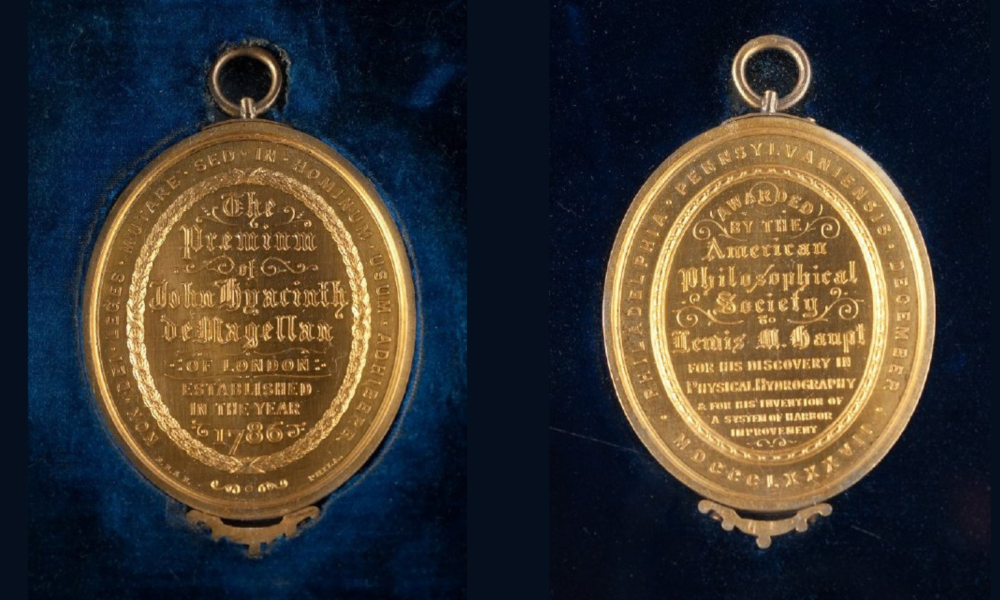2024
Barbara Wold - to be presented at the November 2024 meeting of the Society.
2021
Sara Seager for theoretical work that led to the first detection of exoplanet atmospheres.
2018
Fabiola Gianotti "for her role in the discovery of the Higgs boson and her leadership in elementary particle physics. From the design and construction of the ATLAS detector to the analysis of the data and discovery of the Higgs, Gianotti played a leading role in this milestone event. Today she serves as the Director-General of the European Organization for Nuclear Research (CERN) and is leading the quest to understand matter, energy, space and time at the most fundamental level."
Sandra Faber “for her contributions to the study of galaxy formation and evolution, which have transformed our understanding of these building blocks of the Universe and set the agenda for years to come. From the discovery of the Faber-Jackson relation to her fundamental contributions to the cold dark matter theory of galaxy formation, she has made galaxy formation and evolution a quantitative science.”
2014
Alar Toomre "in recognition of his beautiful and prescient numerical simulations over 40 years ago of the interactions of galaxies ("Galactic Bridges and Tails," carried out with his brother, Juri), and for his development a half century ago of the key local stability criterion (the "Q" criterion) for differentially rotating disks in galaxies.
2008
Margaret J. Geller in recognition of her pioneering observations of the universe.
2004
John E. Carlstrom for his role in measuring the anisotropy in the cosmic microwave background, and especially for his use of instruments based at the Amundsen-Scott South Pole station. This work uses the properties of one of the very harshest and most remote of places on the earth's surface to measure the state of our universe, very long ago.
2002
Wendy Freedman for her role in determining the distances to 18 nearby galaxies with unprecedented accuracy, using the Hubble Space Telescope. She was the leader of the Key Project team, an extraordinary effort involving 27 scientists who collaborated to measure the expansion of the universe. Her careful science, strong leadership, and articulate presentations have helped to lead observational cosmology into the 21st century.
2000
S. Jocelyn Bell Burnell for discovering the first four pulsars in 1967, thereby initiating a field of science that has flourished for a third of a century.
1997
Bradford W. Parkinson for essential contributions to creating the Global Positioning System, thereby making the tools for precision navigation available to everyone.
Roger Easton for essential contributions to creating the Global Positioning System, thereby making the tools for precision navigation available to everyone.
1994
Gordon H. Pettengill. One of the foremost radar astronomers of the past half century, who deserves major credit for the emerging picture of Venus, derived from the data gathered by the Magellan Spacecraft.
1992
Edward C. Stone, scientific leader of the Voyager grand tour of the solar system planets.
1990
Joseph H. Taylor for confirming Einstein's theory of gravitational waves from a binary star system.
1988
George C. Weiffenbach. ". . . the entire group at Johns's Hopkins Applied Physics laboratory who developed this navigational satellite system, but in particular the first pioneers of the Doppler orbit technique [Guier and Weiffenbach].
William H. Guier. The highly precise system, the Transit Satellite Navigational System.
1984
J. Frank Jordon for his role in the Voyager encounters with Jupiter, Saturn and their Satellite.
1980
Martin Lindauer for studies in the field of animal orientation and flight guidance.
1975
Robert Herman and Ralph A. Alpher for their prediction of black-body relict radiation from the early "explosion" of the universe.
1971
Paul M. Muller and William J. Sjogren for their discovery of the lunar mascons (mass concentrations) leading to the first detailed gravimetric map of the moon.
1966
W.H. Pickering for his leadership in the exploration of the Moon and Venus by jet-propelled vehicles.
1961
Edward L. Beach, in recognition of his navigation of the U.S. submarine Triton around the globe.
1960
Stuart William Seeley, in recognition of his work on Shoran.
1959
Charles Stark Draper, in recognition of his pioneer work in modern inertial navigation.
1956
Karl von Frisch for his studies of animal sense organs and his analysis of dance of bees.
1953
Philip Van Horn Weems, in recognition of his invention of methods and instruments for celestial navigation.
1952
James G. Baker, in recognition of his many distinguished contributions to theory and practice in optics, and especially for his design of the super-Schmidt meteor cameras.
1922
Paul R. Heyl and Lyman J. Briggs for the Earth inductor compass.
1887
Lewis M. Haupt for his work on the Physical Phenomena of harbor entrances.
1864
Pliny Earle Chase for the Discovery of certain new relation between the solar-and lunar-dirnal, variations of magnetic force and of barometric pressure.
1836
James P. Espy for A Theory of Rain.
1825
Charles D. Brodie for his invention to repair the side of ships under the surface of the water.
1823
James Ewing for his invention of an improved hydrant.
1820
Josiah Chapman for an improvement in the manufacture of canvas.
1809
James Humphries for a model and description of steering apparatus.
1807
John Garnett for a description and use of a new and simple nautical chart.
1804
William Mugford for an account and description of a temporary rudder.
Benjamin Smith Barton for his work on a number of the pernicious insects of the United States.
1795
Nicholas Collin for a description of a speedy elevator.
1792
Robert Patterson for an improvement on metallic conductors or lightning-rods.
William Thornton for “Cadmus, or a treatise on the elements of written language...With an Essay on the mode of teaching the surd, or deaf and consequently dumb, to speak.”
1790
Francis Hopkinson for the description of a Spring-block, designed to assist in sailing.

